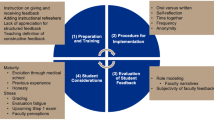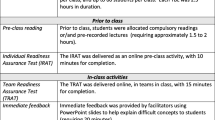Abstract
Introduction
Peer assessment has been promoted as a valuable approach to formative assessment to support learning and peer professionalism. This mixed methods study employed a conceptual framework to explore the factors that enhance the perceived effectiveness of formative peer assessment in the context of team-based learning as a form of collaborative learning.
Materials and Methods
The volume and quality of written peer comments of two medical school classes at three time points were analyzed. Focus groups were then conducted to clarify issues that appeared in the quantitative data and to explore other emerging dimensions.
Results
There was a notable deficiency in both the volume and quality of the comments provided, with no improvement over time. Several factors were identified, including some that are logistical and operational and can be corrected easily, such as the timing of the assignments. Others that stood out as major substantive issues and/or limitations related to the students’ conceptions of the purpose of the peer assessment and to their interpersonal variables.
Discussion
There were social disincentives for students to provide constructive feedback to peers with whom a continuing working relationship is necessary. There was also an inconsistency between the quality of the peer feedback being typically shallow and lacking in substance, and students considering it beneficial.
Conclusion
The findings identify factors that need to be addressed in order to ensure the quality and effectiveness of formative peer assessment among medical students.




Similar content being viewed by others
References
Strijbos JW, Sluijsmans D. Unravelling peer assessment: methodological, functional, and conceptual developments. Learn Instr. 2010;20:265–9.
Nofziger AC, Naumburg EH, Davis BJ, Mooney CJ, Epstein RM. Impact of peer assessment on the professional development of medical students: a qualitative study. Acad Med. 2010;85(1):140–7.
Arnold L. Assessing professional behavior: yesterday, today, and tomorrow. Acad Med. 2002;77(6):502–15.
Prins FJ, Sluijsmans DMA, Kirschner PA, Strijbos JW. Formative peer assessment in a CSCL environment: a case study. Assess Eval High Educ. 2005;30(4):417–44.
Strijbos JW, Narciss S, Dunnebier K. Peer feedback content and sender’s competence level in academic writing revision tasks: are they critical for feedback perceptions and efficiency? Learn Instr. 2010;20:291–303.
Gielen S, Peeters E, Dochy F, Onghena P, Struyven K. Improving the effectiveness of peer feedback for learning. Learn Instr. 2010;20:304–15.
Canavan C, Holtman MC, Richmond M, Katsufrakis PJ. The quality of written comments on professional behaviors in a developmental multisource feedback program. Acad Med. 2010;85(10 Suppl):S106–9.
White JS, Sharma N. Who writes what? Using written comments in team-based assessment to better understand medical student performance: a mixed-methods study. BMC Med Educ. 2012;12:123.
Walker M. The quality of written peer feedback on undergraduates’ draft answers to an assignment, and the use made of the feedback. Assess Eval High Educ. 2014;40(2):232–47.
Ploegh K, Tillema HH, Segers MSR. In search of quality criteria in peer assessment practices. Stud Educ Eval. 2009;35:102–9.
Hovardas T, Tisvitanidou OE, Zacharia ZC. Peer versus expert feedback: an investigation of the quality of peer feedback among secondary school students. Comp Educ. 2013;71:133–52.
Loureiro MJ, Pombo L, Moreira A. The quality of peer assessment in a wiki-based online context: a qualitative study. Educ Media Int. 2012;49(2):139–49.
Prins FJ, Sluijsmans DM, Kirschner PA. Feedback for general practitioners in training: quality, styles, and preferences. Adv Health Sci Educ Theory Pract. 2006;11(3):289–303.
Burgess A, Mellis C. Feedback and assessment for clinical placements: achieving the right balance. Adv Med Educ Pract. 2015;6:373–81.
Slavin R. Cooperative learning: theory, research and practice. Engle wood cliffs NJ: Prencice-Hall; 1990.
Parmelee D, Michaelsen LK, Cook S, Hudes PD. Team-based learning: a practical guide: AMEE guide no. 65. Med Teach. 2012;34(5):e275–87.
Nasr R, Antoun J, Sabra R, Zgheib NK. Interactive and collaborative learning in the classroom at the medical school: automated response systems and team-based learning. J Med Liban. 2016;64(4):217–22.
Levine RE. Peer evaluation in team-based learning. Team-based learning for health professions education: a guide to using small groups for improving learning. First ed. Sterling, Virginia: Stylus Publishing; 2008. p. 103–11.
Cestone C, Levine RE, Lane DR. Peer assessment and evaluation in team-based learning. In: Michaelsen LK, Sweet M, Parmelee DX, editors. Team-based learning: small group learning’s next big step. Wiley InterScience; 2008. p. 69-78.
Speyer R, Pilz W, Van Der Kruis J, Brunings JW. Reliability and validity of student peer assessment in medical education: a systematic review. Med Teach. 2011;33(11):e572–85.
Burgess A, McGregor D, Mellis C. Medical students as peer tutors: a systematic review. BMC Med Educ. 2014;14:115.
Burgess AW, McGregor DM, Mellis CM. Applying established guidelines to team-based learning programs in medical schools: a systematic review. Acad Med. 2014;89(4):678–88.
Han Y, James DH, McLain RM. Relationships between student peer and faculty evaluations of clinical performance: a pilot study. J Nurs Educ Pract. 2013;3(8):170–8.
Reimschisel T, Herring AL, Huang J, Minor TJ. A systematic review of the published literature on team-based learning in health professions education. Med Teach. 2017;39(12):1227–37.
Panadero E, Romero M, Strijbos JW. The impact of a rubric and friendship on peer assessment: effects on construct validity, performance, and perceptions of fairness and comfort. Stud Educ Eval. 2013;39:195–203.
Maas MJ, Sluijsmans DM, van der Wees PJ, Heerkens YF, Nijhuis-van der Sanden MW, van der Vleuten CP. Why peer assessment helps to improve clinical performance in undergraduate physical therapy education: a mixed methods design. BMC Med Educ. 2014;14:117.
Van Gennip NAE, Segers MSR, Tillema HH. Peer assessment as a collaborative learning activity: the role of interpersonal variables and conceptions. Learn Instr. 2010;20:280–90.
Calhoun JG, Ten Haken JD, Woolliscroft JO. Medical students’ development of self- and peer-assessment skills: a longitudinal study. Teach Lear Med: Int J. 2009;2(1):25–9.
van Zundert M, Sluijsmans D, van Merrienboer J. Effective peer assessment processes: research findings and future directions. Learn Instr. 2010;20(4):270–9.
Hamer J, Purchase HC, Denny P, Luxton-Reilly A. Quality of peer assessment in CS1. In Proceedings of the fifth international workshop on computing education research workshop. Assoc Comput Mach. 2009:27–36.
Schifferdecker KE, Reed VA. Using mixed methods research in medical education: basic guidelines for researchers. Med Educ. 2009;43(7):637–44.
Lavelle E, Vuk J, Barber C. Twelve tips for getting started using mixed methods in medical education research. Med Teach. 2013;35(4):272–6.
Zgheib NK, Dimassi Z, Bou AI, Badr KF, Sabra R. The long-term impact of team-based learning on medical students’ team performance scores and on their peer evaluation scores. Med Teach. 2016;38(10):1017–24.
Koles PG. Peer evaluation - examples and graded comments. 2018. https://cdn.ymaws.com/teambasedlearning.site-ym.com/resource/resmgr/Docs/Peer_Eval_examples_graded_co.pdf Accessed January 2019.
Michaelsen LK, Schultheiss EE. Making feedback helpful. Org Behav Teach Rev. 1988;13(1):109–13.
Vaismoradi M, Turunen H, Bondas T. Content analysis and thematic analysis: implications for conducting a qualitative descriptive study. Nurs Health Sci. 2013;15(3):398–405.
Arnold L, Shue CK, Kritt B, Ginsburg S, Stern DT. Medical students’ views on peer assessment of professionalism. J Gen Intern Med. 2005;20(9):819–24.
Levine RE, Kelly PA, Karakoc T, Haidet P. Peer evaluation in a clinical clerkship: students’ attitudes, experiences, and correlations with traditional assessments. Acad Psychiatry. 2007;31(1):19–24.
Bryan RE, Krych AJ, Carmichael SW, Viggiano TR, Pawlina W. Assessing professionalism in early medical education: experience with peer evaluation and self-evaluation in the gross anatomy course. Ann Acad Med Singap. 2005;34(8):486–91.
Cottrell S, Samora JB, Shumway J. An analysis of first-year medical student comments in a peer evaluation of professionalism. Med Sci Educ. 2006;17(1):27–32.
Street SE, Hobbs MM. Face-to-face peer evaluation improved student perception of feedback in a preclinical course. Med Sci Educ. 2015;25(1):9–11.
Tayem YI, James H, Al-Khaja KA, Razzak RL, Potu BK, Sequeira RP. Medical students’ perceptions of peer assessment in a problem-based learning curriculum. Sultan Qaboos Univ Med J. 2015;15(3):e376–81.
Gukas ID, Miles S, Heylings DJ, Leinster SJ. Medical students’ perceptions of peer feedback on an anatomy student-selected study module. Med Teach. 2008;30(8):812–4.
Smith H, Cooper A, Lancaster L. Improving the quality of undergraduate peer assessment: a case for student and staff development. Innov Educ Teach Int. 2002;39(1):71–81.
Linn BS, Arostegui M, Zeppa R. Performance rating scale for peer and self assessment. Br J Med Educ. 1975;9(2):98–101.
Freidson E. Profession of medicine. New York: A study of sociology of applied knowledge; 1990.
Acknowledgments
The authors wish to thank participants of the focus groups.
Author information
Authors and Affiliations
Corresponding authors
Ethics declarations
The study was approved by the Institutional Review Board (IRB) of the American University of Beirut under the expedited category. All focus group participants signed an IRB-approved informed consent form.
Conflict of Interest
The authors declare that they have no competing interests.
Additional information
Publisher’s Note
Springer Nature remains neutral with regard to jurisdictional claims in published maps and institutional affiliations.
Electronic Supplementary Material
Supplementary Box 1
(DOCX 24 kb)
Supplementary Box 2
(DOCX 15 kb)
Supplementary Box 3
(DOCX 15 kb)
Supplementary Table 1
(XLSX 12 kb)
Rights and permissions
About this article
Cite this article
Daou, D., Sabra, R. & Zgheib, N.K. Factors That Determine the Perceived Effectiveness of Peer Feedback in Collaborative Learning: a Mixed Methods Design. Med.Sci.Educ. 30, 1145–1156 (2020). https://doi.org/10.1007/s40670-020-00980-7
Published:
Issue Date:
DOI: https://doi.org/10.1007/s40670-020-00980-7




